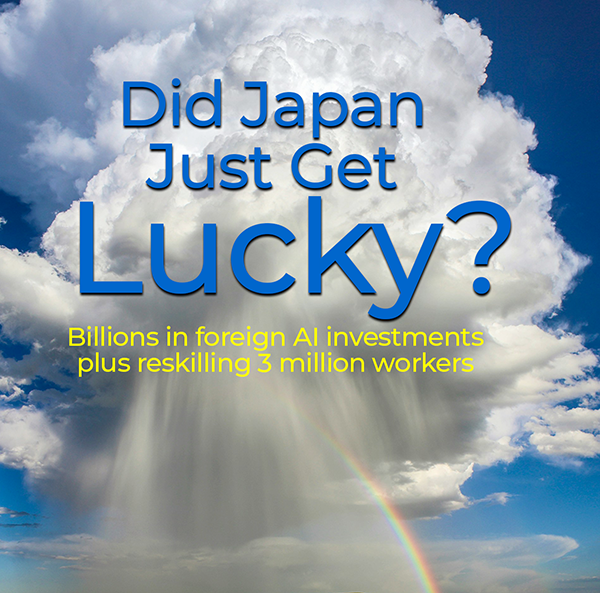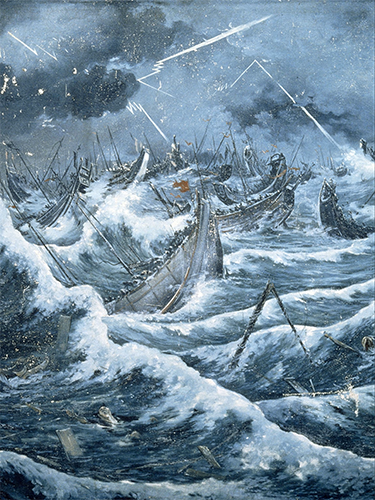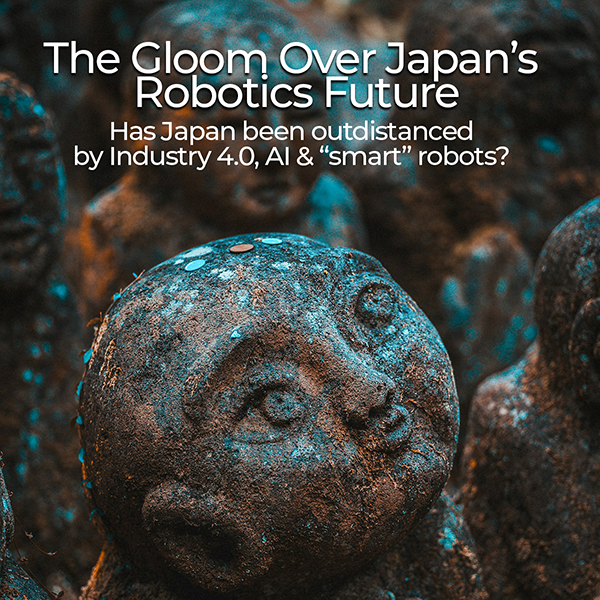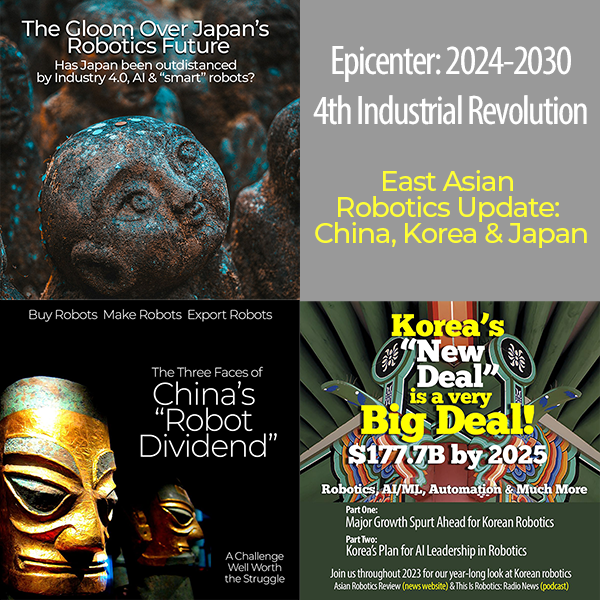
Badly Needed GenAI
& AI Robotics Help for Japan
If historical precedent holds true, the Japanese will turn this foreign largesse into gold
Maybe a divine wind…again
It certainly was far from evident that Japan, solely on its own initiative, would have been successful leaping to GenAI (generative AI) and converged AI “smart” robotics anytime soon.
Japan has a low proficiency in these two all-important technologies. Difficult as it is to imagine Japan being backward in any technology, backward in AI and smart robotics it most surely is. “AI and robotics are not separable. Big changes happened, and we could not catch up,” remarked famed researcher Minoru Asada of Osaka University.
Help is now on the way from foreign sources, with very little coming internally from Japan, which is quite understandable given that Japan has little to offer.
First, global behemoth Accenture hooked up earlier in the year with Mujin Robotics, arguably Japan’s only smart robot developer. Now a Microsoft-led American task force is bringing its vaunted AI expertise, brain power, IP, and an initial $2.9 billion to the high-tech fray. Additionally, and this is mind-blowing, the consortium has also promised to reskill three million Japanese workers “over three years.” A million per year!
If historical precedent holds true, the Japanese will turn this foreign largesse into gold, repeating what they did with automobile assembly lines in the 1950s, transistorized computers in the 1960s, and industrial robots beginning in 1968. The Japanese historian Yoneyuki Sugita calls each of these tech interventions a “divine wind” provided by loving gods just when Japan needed it most. The timing couldn’t be better for a fourth one to hit town just about now.
The backstory
Already far outdistanced and about to be lapped by China and Korea in AI, GenAI, and smart robots, Japan, by mid-2023, was taken by surprise and staggered at the onslaught of global AI.
Our previous article The Gloom Over Japan’s Robotics Future cited a surprisingly benumbed and melancholy Japanese AI tech scene that went something like this:
“The Nature Index ranks Japan seventh in the world for its overall AI and robotics research. None of Japan’s research institutions make it into the top 30 for AI and robotics, based on the Nature Index from 2015 to 2021; and Japan is also increasingly being outperformed by its neighbors in East Asia.
“According to TechWire Asia: Japan will face a deficit of 789,000 software engineers by 2030. Noriyuki Kojima, co-founder of Japanese startup Kotoba Technology, says “Japan’s trailing position in the field of generative AI largely stems from its comparative shortcomings in deep learning and more extensive software development.”

During The Second Invasion Of Japan In 1281 Due To The Typhoon Kamikaze Which Destroyed Most Of The Armada.
Japan’s shortcomings are well-known, especially to its East Asian competition: China and Korea, both of whom are pulling out all stops in their separate quests for GenAI leadership and smart robots. Next up for those two is quantum computing, while Japan languishes at absorbing GenAI.
Japan, needy for everything AI, does not want to miss the gold rush that GenAI has spawned everywhere around the world. Bloomberg Intelligence reports that the GenAI global industry is expected to grow over the next decade, from $40 billion in 2022 to a $1.3 trillion market by 2031.
Of course, at bottom of all this U.S. rush to Japan could have a deeper reason than just being friendly with tech to allies. It could well be all about geopolitical security measures to thwart the perceived regional expansionism of China and its threat to Taiwan.
Here’s a shopping list of high-tech goodies heading to Japan:
$110 million from the University of Washington and Amazon to facilitate partnering with Japanese companies and universities to further increased innovation in AI.
The University of Washington will partner with Japan’s University of Tsukuba to advance the AI industry, from research projects to workforce development to entrepreneurship.
The AI initiative includes two cross-Pacific partnerships: one between the University of Washington and the University of Tsukuba and another between Carnegie Mellon University and Keio University.
The University of Washington has been allocated $50 million for its partnership, with $25 million of that coming from Amazon and another $25 million from GPU titan NVIDIA.
The other $60 million for the partnership between CMU and Keio University is coming from Microsoft and semiconductor company ARM, as well as some Japanese companies.
Microsoft promised to invest $2.9 billion over the next two years to increase its own cloud computing and AI infrastructure in Japan. The investment will double Microsoft’s existing investments to expand AI and cloud infrastructure in Japan.
Microsoft will also train 3 million people across Japan in AI upskilling 2025-2028, and launch its first Microsoft Research Asian Tokyo for research and development on robotics and AI, reports Nikkei Asian Review. “Microsoft will provide $9.9 million to both the University of Tokyo and a partnership between Keio University and Carnegie Mellon University to fund research projects over the next five years.”
Microsoft’s president Brad Smith said that infusing AI into robotic development “gives Japan the opportunity to build on its technological strengths in many other areas,” with the two planning to conduct joint research with other universities on automation technology.
Microsoft will also partner with the Japanese government to strengthen cybersecurity resilience, said Smith.
“Microsoft-backed OpenAI released its AI chatbot ChatGPT in 2022, which touched off a global frenzy on generative AI. There has been a growing demand for large language models, a foundational technology for services such as ChatGPT, on cloud platforms.
“Governments are increasingly claiming “data sovereignty,” which implies that a country’s data should be managed domestically, amid security and privacy concerns.”
In January, Amazon Web Services, the company’s cloud computing arm, announced it would invest $15 billion in cloud infrastructure in Japan by 2027.
Amazon and Microsoft — among the Seattle area’s largest employers and two of the country’s tech giants — have invested heavily to make a name for themselves in the fiercely competitive AI industry. Microsoft has consistently backed OpenAI, the startup that catapulted generative AI into the public eye when it launched ChatGPT, while Amazon has invested billions in AI startup Anthropic.
With Amazon and Anthropic, plus Microsoft and OpenAI, plus NVIDIA and ARM, Japan has suddenly gained a dream team of the world’s best mentors and partners. Just maybe, it’s another divine wind in the making.


